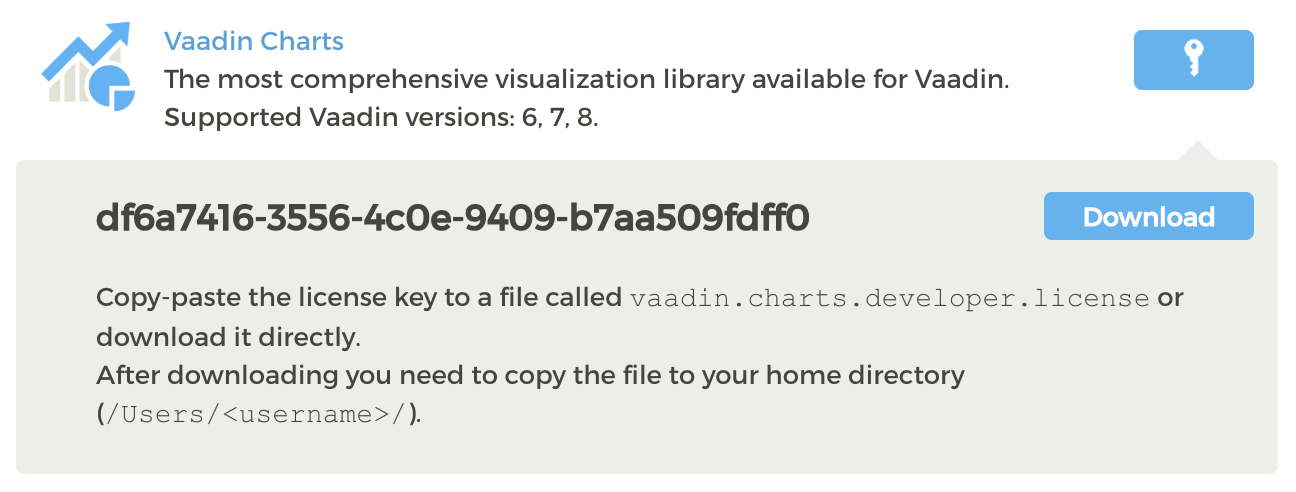Java License Key Generator Example

- Java License Key Generator Example For Free
- Java Get Key
- License Key
- Java License Key Generator Example For Sale
License4J License Manager and Library for Software Licensing Features. License4J comes with many licensing features and serial number generation methods and required validation methods implemented.
- Dec 29, 2016 When it comes to encryption and signing RSA is the de facto standard for public key cryptography. Invented in 1977 RSA (named after it’s inventors, Ron Rivest, Adi Shamir, and Leonard Adleman) and it’s successors are still used in many if not most of the systems you use today.
- True License is both a Java license key generator and a license key validator, meaning that you can use it on your server to create license keys, and then use it again in your Java application (presumably a Java GUI application) to install and verify the license that you generate.
- To generate the serial, we need a input string and based on the input string we will be generating MD2, MD5 and SHA1 hashes. The method calculateSecurityHash takes the input string and the hashing method as input and generates the hash based on the method.
Key generators are constructed using one of the getInstance class methods of this class.
KeyGenerator objects are reusable, i.e., after a key has been generated, the same KeyGenerator object can be re-used to generate further keys.
There are two ways to generate a key: in an algorithm-independent manner, and in an algorithm-specific manner. The only difference between the two is the initialization of the object:
- Algorithm-Independent Initialization
All key generators share the concepts of a keysize and a source of randomness. There is an
initmethod in this KeyGenerator class that takes these two universally shared types of arguments. There is also one that takes just akeysizeargument, and uses the SecureRandom implementation of the highest-priority installed provider as the source of randomness (or a system-provided source of randomness if none of the installed providers supply a SecureRandom implementation), and one that takes just a source of randomness.Import os from Crypto.PublicKey import RSA key = RSA.generate(2048, os.urandom) print key.exportKey('OpenSSH') This code works for me: import os from Crypto.PublicKey import RSA key = RSA.generate(2048, os.urandom) # Create public key. Sshrsa = '00000007' + base64.b16encode('ssh-rsa') # Exponent. Mar 31, 2018 It is a simple one liner command to generate a public key from a private key, so lets say our private key is named ‘user@myserver.key’ and we want to generate the public key and name it ‘authorizedkeys’. Below is the command to do this. User@workstation:$ ssh-keygen -y -f user@myserver.key authorizedkeys 1. Generate ssh key openssl python.
Since no other parameters are specified when you call the above algorithm-independent
initmethods, it is up to the provider what to do about the algorithm-specific parameters (if any) to be associated with each of the keys. - Algorithm-Specific Initialization
For situations where a set of algorithm-specific parameters already exists, there are two
initmethods that have anAlgorithmParameterSpecargument. One also has aSecureRandomargument, while the other uses the SecureRandom implementation of the highest-priority installed provider as the source of randomness (or a system-provided source of randomness if none of the installed providers supply a SecureRandom implementation).
In case the client does not explicitly initialize the KeyGenerator (via a call to an init method), each provider must supply (and document) a default initialization. See the Keysize Restriction sections of the JDK Providers document for information on the KeyGenerator defaults used by JDK providers. However, note that defaults may vary across different providers. Additionally, the default value for a provider may change in a future version. Therefore, it is recommended to explicitly initialize the KeyGenerator instead of relying on provider-specific defaults.
Every implementation of the Java platform is required to support the following standard KeyGenerator algorithms with the keysizes in parentheses:
AES(128)DES(56)DESede(168)HmacSHA1HmacSHA256
The Java KeyGenerator class (javax.crypto.KeyGenerator) is used to generate symmetric encryption keys. A symmetric encryption key is a key that is used for both encryption and decryption of data, by a symmetric encryption algorithm. In this Java KeyGenerator tutorial I will show you how to generate symmetric encryption keys.
Java License Key Generator Example For Free
Creating a KeyGenerator Instance
Before you can use the Java KeyGenerator class you must create a KeyGenerator instance. You create a KeyGenerator instance by calling the static method getInstance() passing as parameter the name of the encryption algorithm to create a key for. Here is an example of creating a Java KeyGenerator instance:
This example creates a KeyGenerator instance which can generate keys for the AES encryption algorithm.
Initializing the KeyGenerator
After creating the KeyGenerator instance you must initialize it. Initializing a KeyGenerator instance is done by calling its init() method. Here is an example of initializing a KeyGenerator instance:
The KeyGeneratorinit() method takes two parameters: The bit size of the keys to generate, and a SecureRandom that is used during key generation.
Java Get Key
Generating a Key

License Key
Once the Java KeyGenerator instance is initialized you can use it to generate keys. Generating a key is done by calling the KeyGeneratorgenerateKey() method. Here is an example of generating a symmetric key: